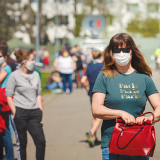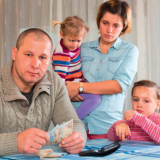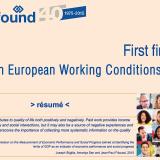EU context
Komisija je 26. travnja 2017. pokrenula paket europskog stupa socijalnih prava. To uključuje inicijativu za potporu održavanju ravnoteže između poslovnog i privatnog života za roditelje i skrbnike. Cilj je inicijative rješavanje pitanja nedovoljne zastupljenosti žena na tržištu rada i donosi niz novih ili poboljšanih minimalnih standarda za roditeljski i očinski dopust te dopust za skrbnike.
Rad Eurofounda
Prikupljanje podataka
Eurofoundova Europska istraživanja o kvaliteti života (EQLS-ovi) pružaju usporedbe među zemljama u pogledu usklađivanja posla i obiteljskog života, fleksibilnog radnog vremena i osiguravanja kvalitetnih usluga skrbi. Europska istraživanja o poduzećima (ECS-ovi) pružaju podatke o tome zašto i kako poduzeća upotrebljavaju cijeli niz načina organizacije radnog vremena. U Europskim istraživanjima o radnim uvjetima (EWCS-ovi) analiziraju se organizacija radnog vremena u cijelom EU-u i pitanja povezana s njom, uključujući fleksibilno radno vrijeme, preferencije u pogledu radnog vremena i ravnotežu između poslovnog i privatnog života.
Europski opservatorij radnog vijeka (EurWORK) pruža informacije o radnim uvjetima i održivom radu, uključujući bazu podataka o plaćama, radnom vremenu i kolektivnim sporovima. Eurofound je također analizirao gospodarske i socijalne troškove razlike u stopama zaposlenosti s obzirom na spol i pruža informacije o stvaranju radnih mjesta u uslugama skrbi.
Vizualizacija podataka
Aktualno: Usmjerenost Zaklade na pronalazak rješenja za uspostavljanje ravnoteže između poslovnog i privatnog života
23. prosinca 2016. – U publikaciji Focus Eurofounda obrađuje se pitanje ravnoteže između poslovnog i privatnog života i nekih od čimbenika koji pomažu ili odmažu radnicima u usklađivanju poslovnog i privatnog života. Budući da se prosječno radno vrijeme neprestano smanjuje, postavlja se pitanje je li još uvijek važna ravnoteža između poslovnog i privatnog života. Kako Direktiva o radnom vremenu može pomoći i kakvu ulogu imaju politike o fleksibilnom radnom vremenu? Koje specifične potpore trebaju oni koji imaju odgovornosti u pogledu skrbi za djecu ili odrasle osobe? Ravnoteža između poslovnog i privatnog života povezana je s ostalim aspektima života, uključujući potrebu za kvalitetnom skrbi o djeci, uklanjanjem razlike u stopama zaposlenosti s obzirom na spol i pripremom starijih radnika koji ne mogu nastaviti raditi puno radno vrijeme.
Ravnoteža između poslovnog i privatnog života: Pronalazak rješenja za sve






















